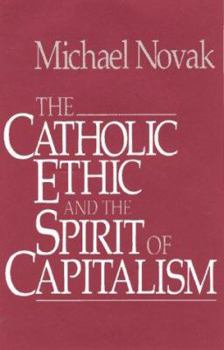Catholic Ethic And The Spirit Of Capitalism
Select Format
Select Condition 
Book Overview
The Catholic Church has, for generations, been reluctant to come to terms with capitalism. Novak argues that a 100-year debate within the Catholic Church has yielded a richer and more humane vision of... This description may be from another edition of this product.
Format:Hardcover
Language:English
ISBN:002923235X
ISBN13:9780029232354
Release Date:February 1993
Publisher:Free Press
Length:334 Pages
Weight:1.52 lbs.
Dimensions:1.2" x 6.4" x 9.6"
Customer Reviews
3 ratings
Catholicism and Capitalism Go Together
Published by Thriftbooks.com User , 22 years ago
Not only is capitalism moral, but Novak proves out how the Catholic church has a history of rejecting socialism and exalting the capitalist society. Contrary to Max Weber's work on the Protestant Ethic, all of Catholicism is not one big tome to social justice and human rights. From _Rerum Novarum_ to _Centesimus Annus_, Catholicism captures the spirit of entrepreneurial ingenuity and liberty.
a celebration of capitalism tempered by a warning
Published by Thriftbooks.com User , 24 years ago
"Those who are convinced that they know the truth and firmly adhere to it are considered unreliable from a democratic point of view, since they do not accept that truth is determined by the majority, or that it is subject to variation according to different political trends. It must be observed in this regard that if there is no ultimate truth to guide and direct political activity, then ideas and convictions can easily be manipulated for reasons of power. As history demonstrates, a democracy without values easily turns into open or thinly disguised totalitarianism." Pope John Paul II, _Centesimus_Annus_-1991, #46Michael Novak has written several books on the impact of capitalism on democratic society, including _The_Catholic_Ethic_and_the_Spirit_of_Capitalism_. In essence, this volume contains a synopsis of papal thought on economics from Leo XIII in his encyclical _Rerum_Novarum_ (1891) to John Paul II in his centennial rejoinder _Centesimus_Annus_ (1991). This tumultuous period in between these two documents oversaw the rise of socialism and its final collapse. These events lead to the question, does capitalism engender a moral superiority as an economic system. The book leads the reader to the conclusion in the qualified affirmative.Modern society maintains three dimensions involving public participation--political, economic and moral. Democracy (or probably more accurately, constitutional republican government) constitutes probably the best political form that flawed humans can achieve in this life. Capitalism has been demonstrated to be the most effective economic means to ensure maximum benefit (in productivity and material reward) for the greatest number of persons. Publicly expressed religious worship (particularly the Judeo-Christian creeds) have blessed society with moral leavening to help counter the vices so prevalent among persons at large in all walks of life. That socialism has collapsed so utterly is partly due to its _unitary_ nature. It intends to concentrate all powers--political, economic and moral--into the apparatus of the state. However, a democratic capitalist society with no accountability to God will also ultimately degenerate and collapse.Leo XIII criticized to Europe's early Marxist movement, predicting that "The Socialists, working on the poor man's envy of the rich, endeavor to destroy private property, and maintain that individual possessions should become the common property of all, to be administered by the State... But their proposals are so clearly futile for all practical purposes, that if they were carried out the working man himself would be among the first to suffer." He extends his comments noting that the socialists "act against natural justice and threaten the very existence of family life. And such interference... is quite certain to... subject [all citizens] to odious and intolerable slavery... Ideal equality--of which so much is said--would, in re
the morality of capitalism
Published by Thriftbooks.com User , 25 years ago
I've lived through the '50's red scares,communist world expansion, the '60's nihilism and militaristic support for capitalistic expansion. I've witnessed the polemics of the 80's and '90's, culminating in the demise of Communism and the emergence of a "Third way" synthesis. Capitalism always appealed to the intellect as logical but, knowing that not all humans are hard working and creative, capitalism in its pure state always seemed morally lacking. Mike Novak argues this is like blaming the car engine for and moral deficits of a drunk driver. While providing an interesting ride, this socio-economic -political rollercoaster has always lacked a tanscendent moral order. Along the way, pundits, social critics and propogandists produced a moral overview both fragmentary and conflicting. Mike Novak's book assigns some greater moral clarity to the choas of this historical tumult. He argues that one may be both a devout catholic and an enthusiastic capitalist, that indeed, being catholic may even oblige one to be a capitalist. He stenghens his views with the imprimatur of encyclicals, both eloquent and prescient, by Popes Leo XIII through John Paul II. Each humanistic and thoughtful citizen, whether a member of The American Republic or the world at large, must ask: Are private property and the pursuit of profit moral goods or evils? Are capitalism's excesses and shortcoming the faults of the economic order itself or the hosting culture? Is the pursuit of self interest a natural expression of god-given talent (hence a moral imperative to inspire, protect and empower others) or is it the selfish and exploitative. Is greed good? When does legitimate self interest become greed? Is global expansion of American capitalism righteous, as an escape from the enslavement of starvation-level poverty? Or is it simply an invitation to starve more freely? Is the inclusion of world citizens an invitation to the feast of expanding prosperity or an exploitation of their circumstance? Should the social conscience of a corporation make good business sense? Is it even possible? Is it theologically sound? Is it theologically required? After reading Professor Novak's book, I believe each reader will have a clearer view of capitalism's moral strengh and the weakness of opposing neo-socialist apostasies.






